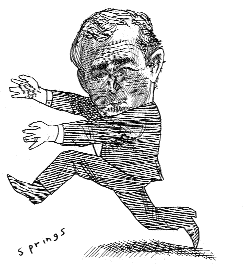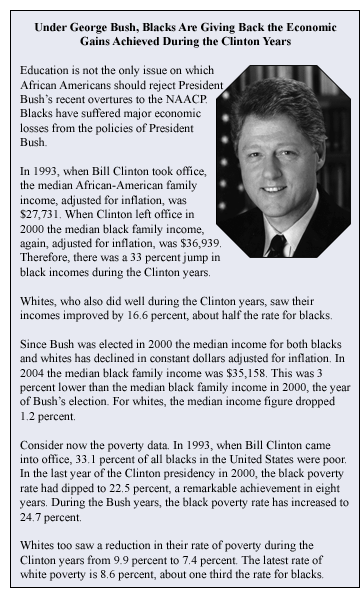George W. Bush, the NAACP, and the Persistent Damage to Black Higher Education
President Bush has enjoyed improved relations with the NAACP since business executive Bruce Gordon assumed the presidency of the nation’s oldest civil rights organization. But NAACP chair Julian Bond continues to pull no punches, lambasting the president in his opening remarks to the delegates at the annual NAACP convention earlier in the week, before Bush made his appearance. Clearly, Bush’s appearance at the NAACP convention was driven by political considerations. In past years the GOP believed it could win more white votes in stonewalling black aspirations than it would gain by appealing to black votes. Now with the GOP facing the possible loss of one or both houses of Congress in the coming midterm elections, President Bush’s GOP is fighting for every vote it can get, and now that includes those of African Americans. Bush’s address to the NAACP delegates included the classic mantras:
In some ways the speech worked. Wade Henderson of the Leadership Conference on Civil Rights said that Bush’s address to the NAACP convention “was one of the most effective speeches of his tenure” and a “new political high for Bush.” At the NAACP meeting there was in fact some applause for a few of the president’s remarks about education. The president made an appeal for NAACP votes by citing his support for historically black colleges and universities, his appointment of several African Americans to high-ranking positions in his administration, and his support for the renewal of the Voting Rights Act. • The maximum Pell Grant award for low-income college students has remained the same for the past five years. For 2007 Bush once again proposed no increase in the maximum Pell Grant award. Even today, the maximum Pell Grant award no longer comes close to providing even half the cost of higher education at state-operated colleges or universities. The freeze in Pell Grant awards has been particularly hard on blacks. Blacks receive 27 percent of all Pell Grant scholarships. About 45 percent of all black undergraduate students receive and are dependent on Pell Grant scholarships. • In December 2004 the Bush administration announced restrictive new changes in the formula the government uses to determine who is eligible for Pell Grants. Under the new rules families are not able to deduct state and local taxes from their incomes and therefore they are expected to make a larger family contribution to their children’s education. As a result, it was estimated by the American Council on Education that 89,000 students who had received Pell Grants will no longer be eligible. Another 1.3 million low-income students will receive smaller Pell Grant awards. In total, the new financial aid formula stripped $300 million from the Pell Grant program. Clearly, this did serious harm to black chances for a college education. • For 2007 Bush proposed to eliminate the $65 million Perkins college loan program for low-income students. In a similar request, he tried this last year but the proposal was rejected by a Republican-controlled Congress. • On Martin Luther King Day in 2003, Bush chose to announce his administration’s support for the plaintiffs who challenged the University of Michigan’s affirmative action admissions program. In addition to filing briefs in opposition to the continuation of race-sensitive admissions, Bush’s solicitor general Ted Olsen, one of the nation’s most influential right-wing ideologues, argued the case for banning affirmative action before the United States Supreme Court.
The record on Roberts appears to be even worse due to information that came to light in his confirmation hearings. Before the hearings it was discovered that a file headed “Affirmative Action” was missing from the White House files stored at the Ronald Reagan Presidential Library. Roberts had worked as a White House aide during the Reagan administration. A report from the National Archives inspector general found that White House aides from the Bush administration visited the Reagan Library to do a background check on Roberts. The report found that the aides were permitted to bring personal items into the library and they were left alone at times with the document collection. The report says that the White House aides were the last known people to see the file entitled “Affirmative Action.” There is solid evidence that Samuel Alito, Bush’s latest appointment to the Supreme Court, also appears to be a strong opponent of affirmative action. In a 1985 application to work for the Reagan administration’s Justice Department, Alito wrote, “I am particularly proud of my contributions in recent cases in which the government has argued that racial and ethnic quotas should not be allowed.” • Bush has also nominated several justices to the U.S. Court of Appeals who are staunch opponents of any form of affirmative action. Included among this group are two blacks, Janice Rogers Brown, who has been confirmed to the D.C. circuit, and Jerome A. Holmes, currently under consideration for a seat on the Tenth Circuit Court of Appeals. As a justice of the California Supreme Court, Janice Rogers Brown wrote the majority decision upholding the legality of Proposition 209. She has stated that “affirmative action is no different than Jim Crow.” Holmes criticized the 2003 Supreme Court Grutter decision by saying the Court “missed an important opportunity to drive the final nail in the coffin of affirmative action.”
In one case the Justice Department sued Southern Illinois University to force it to eliminate fellowship programs that were established to benefit blacks and other minorities. To avoid the litigation, the university caved in and eliminated the programs. • The president proposed to eliminate funds from student outreach programs such as Upward Bound, Gear Up, and Talent Search. These are programs that seek to encourage disadvantaged students to enroll in higher education. The president also tried to eliminate these programs last year but Congress rejected the cuts. • Under the president’s new 2007 budget proposal, funding for black colleges and universities would be frozen at 2006 levels. • The president’s budget calls for the elimination of the Thurgood Marshall Legal Educational Opportunity Program, a tutoring program for minority and low-income students who aspire to go to law school. • The president has gutted many adult education programs at community colleges which many African Americans used for job-related retraining. • New regulations governing welfare recipients issued by the Bush administration earlier this summer would sharply reduce the number of low-income people who are able to enroll in high education. The new rules require states to move more quickly to transfer people from the welfare rolls to payrolls. Previously, welfare recipients could still qualify for benefits if they were enrolled in higher education instead of working. But under the new regulations, welfare recipients will be allowed to continue to receive benefits for one year only if they are enrolled in vocational training but not in undergraduate or graduate degree programs. Associ-ate degree programs at community colleges would be permitted but only if the student were enrolled in a program that trained him or her for a specific vocation. • Overall spending for the Department of Education was reduced by 5.5 percent for 2007. Department of Education spending will be down $3.1 billion in 2007. Some 42 programs would be eliminated including a program to encourage drug-free schools. The delegates attending the NAACP convention were mostly polite to the president and many of them even laughed at his jokes. But the president’s record on black higher education is no joke. It is a tragedy. |
|





 • Both of President Bush’s nominees to the Supreme Court — John Roberts and Samuel Alito — appear to be strong opponents of affirmative action. In late 1981 Roberts wrote a critique of a Civil Right Commission report in which he said the “obvious reason” for the failure of affirmative action programs was because they “required the recruiting of inadequately prepared candidates.”
• Both of President Bush’s nominees to the Supreme Court — John Roberts and Samuel Alito — appear to be strong opponents of affirmative action. In late 1981 Roberts wrote a critique of a Civil Right Commission report in which he said the “obvious reason” for the failure of affirmative action programs was because they “required the recruiting of inadequately prepared candidates.” • Bush’s nominations to the U.S. Commission on Civil Rights and the Office for Civil Rights at the U.S. Department of Education have been conservative opponents of affirmative action. The Office for Civil Rights at the Depart-ment of Education appears to have turned its attention to pressuring colleges and universities to abandon programs designed specifically for blacks or to open them up to students of all races.
• Bush’s nominations to the U.S. Commission on Civil Rights and the Office for Civil Rights at the U.S. Department of Education have been conservative opponents of affirmative action. The Office for Civil Rights at the Depart-ment of Education appears to have turned its attention to pressuring colleges and universities to abandon programs designed specifically for blacks or to open them up to students of all races.